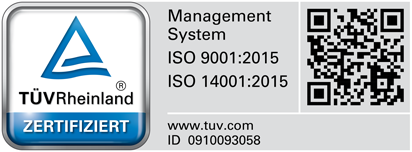sales@lufapak.de +49 2631/384-0 Contactform
In today’s digital world, the efficient handling and distribution of information plays a central role in the success of organisations. This is the field of information logistics, which deals with the planning, management and control of the flow of information within and between organisations. The relevance of this topic cannot be overestimated: Efficient information logistics makes a significant contribution to optimising business processes, accelerating decisions and securing competitive advantages.
The exact definition of information logistics
Information logistics is the discipline that deals with the efficient planning, management and control of the flow of information within and between organisations. It encompasses all activities required to collect, process, store and distribute information with the aim of maximising the availability and quality of information.
Central concepts of information logistics include the following principles:
- Relevance: Information must be collected and processed in a targeted manner to ensure that only the data that is relevant to the task or decision at hand is forwarded.
- Availability: Information must be available in the right place at the right time. This requires a well-designed infrastructure for storing and retrieving data, often supported by modern IT systems.
- Quality: The accuracy and reliability of the information provided is crucial. Information must be correct, complete and up-to-date in order to make informed decisions.
- Security: Protecting sensitive data and ensuring information security is a top priority. This includes measures for data backup and protection against unauthorised access.
- Efficiency: The entire information logistics process must be designed to minimise the use of resources. This means that information flows should be optimised and redundancies avoided.
Information logistics is therefore an integral part of modern business management, helping to optimise business processes and increase the competitiveness of companies. By applying these basic principles, companies can ensure that they receive the right information at the right time and in the quality required to make effective and efficient decisions.
Examples of information logistics
Information logistics is used in many areas of modern business and plays a central role in optimising processes and improving efficiency.

Supply chain management
In supply chain management, information logistics ensures that all participants along the supply chain – from the raw material supplier to the end customer – are always informed about the current status. Real-time data on stock levels, production progress and delivery times make it possible to avoid bottlenecks, optimise stocks and speed up delivery processes.
Customer Relationship Management (CRM)
In CRM systems, information logistics is crucial for maintaining and managing customer relationships. Information about customer interactions, purchase histories and preferences is collected and analysed in order to design personalised marketing campaigns and improve customer service. This enables companies to respond specifically to customer needs and increase customer satisfaction.
Production planning and control
In production planning, information logistics ensures an efficient flow of information between the various production stages. Data on material availability, machine capacities and work schedules are monitored and coordinated in real time to ensure smooth production and minimise downtimes.
E-commerce
In e-commerce, information logistics plays a central role in the management of online orders, inventory management and shipping logistics. Real-time updates on product availability and delivery status information enable both sellers and customers to organise the purchasing process transparently and efficiently.
Finance
In finance, information logistics ensures that up-to-date and accurate financial data is available for analyses and reports. This includes the collection and processing of data on transactions, account balances and market trends in order to make informed investment decisions and fulfil regulatory requirements.
Healthcare
In hospitals and medical centres, information logistics ensures that patient data, laboratory results and treatment plans reach the right places in a timely and secure manner. This improves coordination between different departments and enables faster and more precise medical care.
Tasks of information logistics
Information logistics encompasses a variety of tasks aimed at efficiently organising the flow of information within and between organisations. One of the main tasks is the collection and collation of information. This includes identifying relevant data sources and obtaining the necessary information from various internal and external sources. It is important to ensure that the data collected is accurate and up-to-date.
Another key task is processing and analysing information. Information logisticians must process, structure and analyse the collected data in order to make it usable for various purposes. This can include using data analysis tools and methods to recognise patterns and trends that are important for business decisions.
In addition, the storage and management of information plays a crucial role. Efficient information logistics requires well-organised databases and systems that allow quick access to the information needed. Proper storage ensures that information is secure and easy to find, which speeds up decision-making and minimises errors.
Another important aspect is the distribution and provision of information. Information logisticians ensure that the right information reaches the right recipients at the right time. This can be achieved through the use of information systems, networks and communication platforms that facilitate the flow of information within the organisation and with external partners.
Finally, ensuring information quality and security is an essential task. The quality of information must be constantly monitored and guaranteed by implementing measures for data validation and verification. In addition, information logisticians must set up security mechanisms to protect sensitive data from unauthorised access and loss.
Advantages of information logistics
Implementing effective information logistics offers numerous benefits for organisations that go far beyond simply improving the flow of information. First of all, optimised information logistics leads to more efficient business processes. The timely availability of accurate information allows processes to run faster and more smoothly. Delays and bottlenecks are minimised, which increases overall productivity.
Another key benefit is cost reduction. By reducing inefficient workflows and minimising information loss, companies can make significant savings. For example, overstocking or unnecessary warehousing costs are avoided as accurate inventory data is available at all times. Savings can also be made in terms of human resources, as less time is spent searching for and processing information.
In addition, information logistics helps to improve decision-making. Sound decisions are based on accurate and up-to-date data. Information logistics ensures that decision-makers have access to the information they need at all times, enabling them to make faster and better-informed decisions. This can be a competitive advantage, particularly in dynamic market environments.
Another advantage lies in the increase in customer satisfaction. Thanks to the optimised flow of information, customer enquiries can be answered more quickly and precisely. For example, good information logistics in e-commerce enables customers to track the status of their order at any time. This creates transparency and trust and improves the overall customer experience.
Information logistics also enables better collaboration within and outside the company. Through the seamless integration of different systems and departments, information can be shared and utilised efficiently. This promotes teamwork and improves coordination between different areas of the organisation as well as with external partners and suppliers.
Challenges in information logistics
Despite its many benefits, companies face various challenges when implementing and maintaining effective information logistics. One of the biggest hurdles is data quality. The data collected is often incomplete, outdated or incorrect. This can lead to incorrect decisions and affect the overall flow of information. To solve this problem, companies need to implement and continuously monitor strict data validation and cleansing procedures.
Another common problem is data integration. Many organisations have different systems and data sources that are not compatible with each other. This makes it difficult for information to flow smoothly and leads to redundancies and inefficiencies. Solutions such as the implementation of enterprise resource planning (ERP) systems or middleware platforms that integrate different systems and create a standardised database are ideal here.
Information security is also a major challenge. Companies must ensure that sensitive data is protected against unauthorised access, theft and loss. This requires comprehensive security measures such as encryption, access controls and regular security checks. In addition, employee training should be provided to raise awareness of security risks and ensure the secure handling of information.
Another problem is the volume of data. With advancing digitalisation and the increasing spread of big data, companies are confronted with an exponentially growing amount of data. Effectively managing and utilising this enormous flood of data requires powerful IT infrastructures and sophisticated data management strategies. The use of cloud solutions and automated data analysis tools can help to manage the volume of data and gain valuable insights.
Aligning information logistics with business processes is another challenge. Information logistics must be seamlessly integrated into existing business processes, which requires close collaboration between the specialist departments and the IT department. It is important that information logistics solutions are flexible and adaptable in order to meet constantly changing business requirements.
Contact us now and get advice


